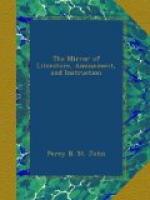There bee, says this author, within a mile and a halfe from my house every waye, five hundred poore habitations; whose greatest meanes consist in spinning flaxe, hemp, and hurdes. They dispose the seasons of the yeare in this manner; I will begin with May, June, and July, (three of the merriest months for beggers,) which yield the best increase for their purpose, to raise multitudes: whey, curdes, butter-milk, and such belly provision, abounding in the neighbourhood, serves their turne. As wountes or moles hunt after wormes, the ground being dewable, so these idelers live intolerablie by other meanes, and neglect their painfull labours by oppressing the neighbourhood. August, September, and October, with that permission which the Lord hath allowed the poorer sorte to gather the eares of corne, they do much harme. I have seen three hundred leazers or gleaners in one gentleman’s corn-field at once; his servants gathering and stouking the bound sheaves, the sheaves lying on the ground like dead carcases in an overthrown battell, they following the spoyle, not like souldiers (which scorne to rifle) but like theeves desirous to steale; so this army holdes pillaging, wheate, rye, barly, pease, and oates; oates, a graine which never grew in Canaan, nor AEgypt, and altogether out of the allowance of leazing.
Under colour of the last graine, oates, it being the latest harvest, they doe (without mercy in hotte bloud) steale, robbe orchards, gardens, hop-yards, and crab trees; so what with leazing and stealing, they doe poorly maintaine themselves November, December, and almost all January, with some healpes from the neighbourhood.
The last three moneths, February, March, and Aprill, little labour serves their turne, they hope by the heat of the sunne, (seasoning themselves, like snakes, under headges,) to recover the month of May with much poverty, long fasting, and little praying; and so make an end of their yeares travel in the Easter holy days.
* * * * *
BEGGARS.
In the earlier periods of their history, both in England and Scotland, beggars were generally of such a description as to entitle them to the epithet of sturdy; accordingly they appear to have been regarded often as impostors and always as nuisances and pests. “Sornares,” so violently denounced in those acts, were what are here called “masterful beggars,” who, when they could not obtain what they asked for by fair means, seldom hesitated to take it by violence. The term is said to be Gaelic, and to import a soldier. The life of such a beggar is well described in the “Belman of London,” printed in 1608—“The life of a beggar is the life of a souldier. He suffers hunger and cold in winter, and heate and thirste in summer; he goes lowsie, he goes lame; he is not regarded; he is not rewarded; here only shines his glorie. The whole kingdome is but his walk; a whole cittie is but his parish. In every man’s kitchen is his meate dressed; in every man’s sellar lyes his beere; and the best men’s purses keepe a penny for him to spend.”




